Unit 11 How was your school trip?(Section B 1a-2c)
文档属性
| 名称 | Unit 11 How was your school trip?(Section B 1a-2c) | 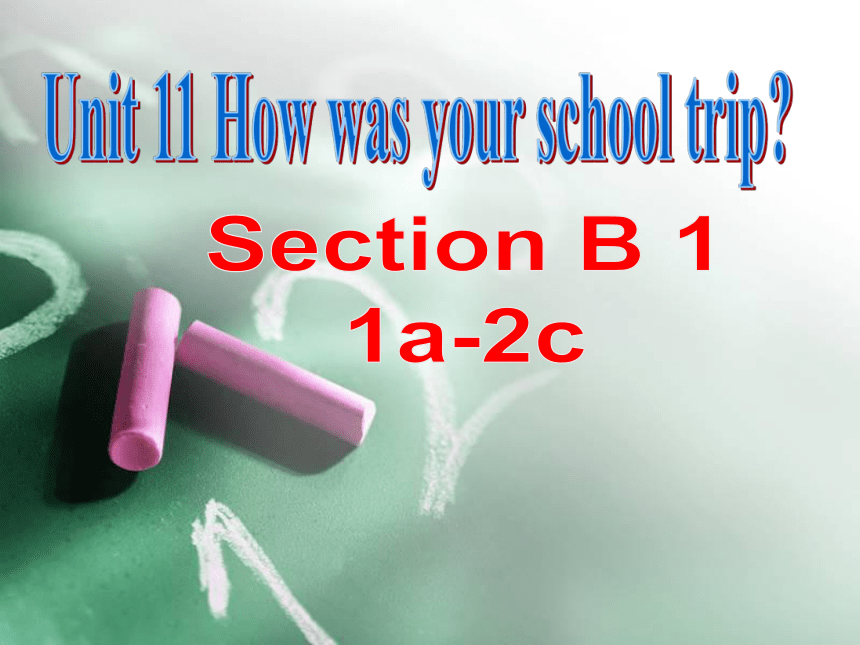 | |
| 格式 | zip | ||
| 文件大小 | 3.1MB | ||
| 资源类型 | 教案 | ||
| 版本资源 | 人教新目标(Go for it)版 | ||
| 科目 | 英语 | ||
| 更新时间 | 2013-06-14 11:35:15 | ||
图片预览

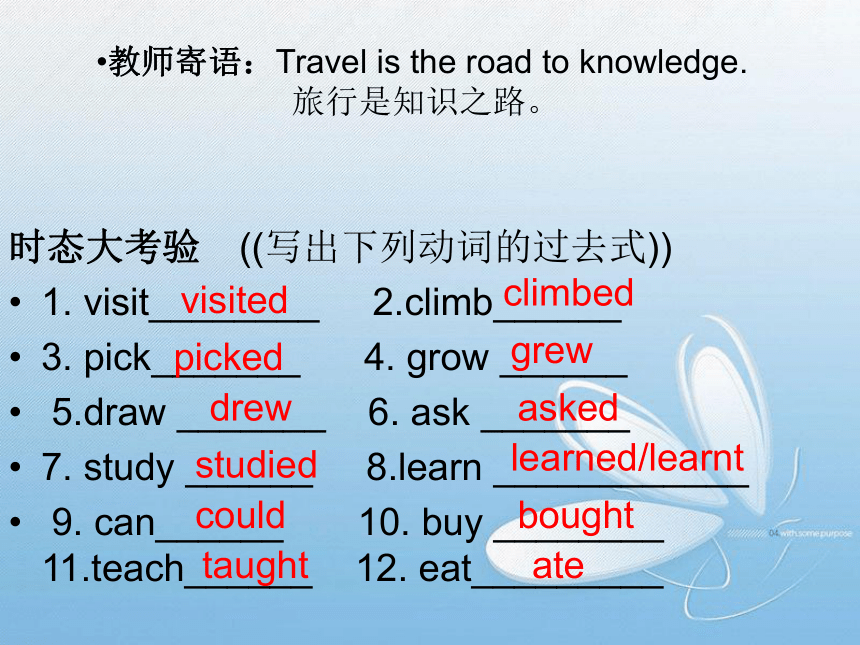
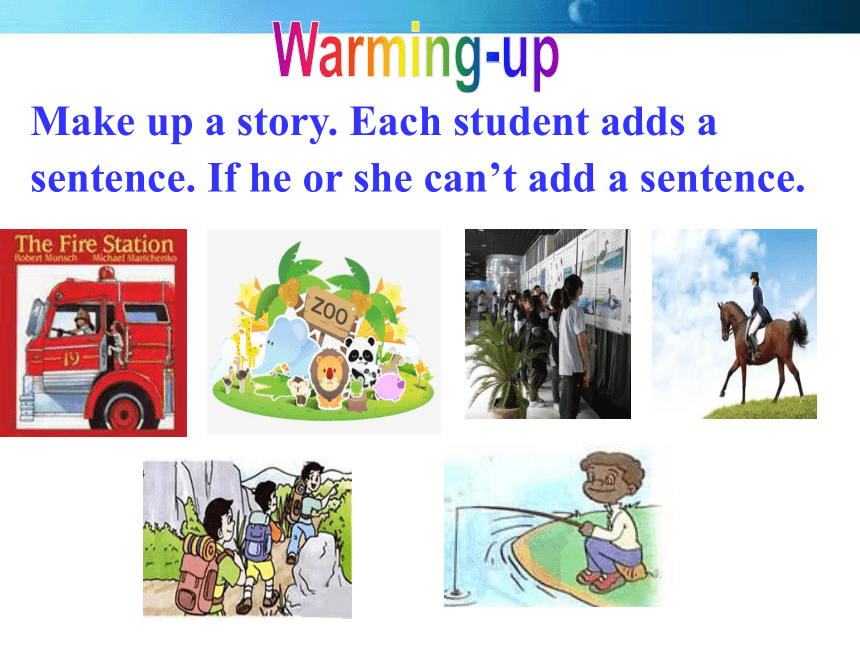
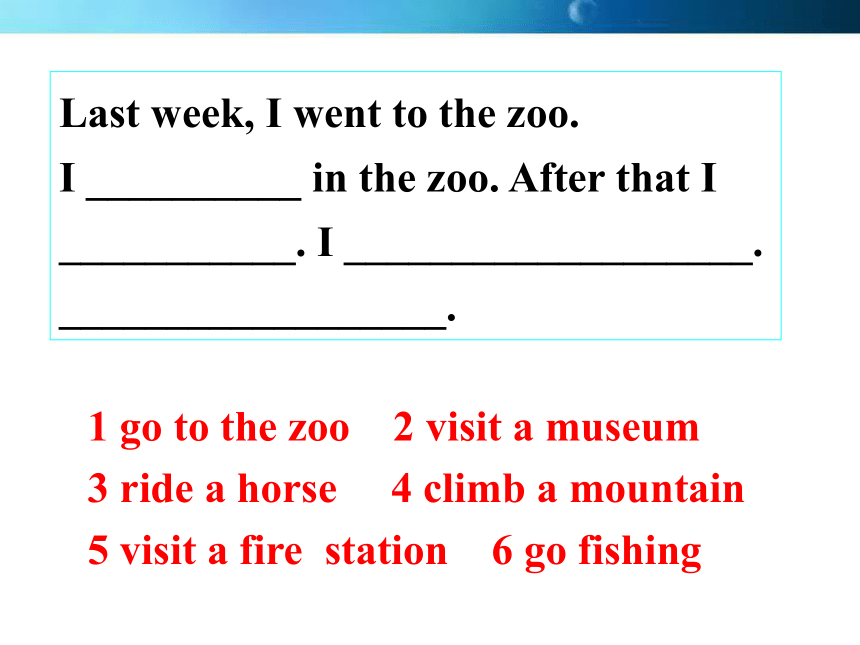
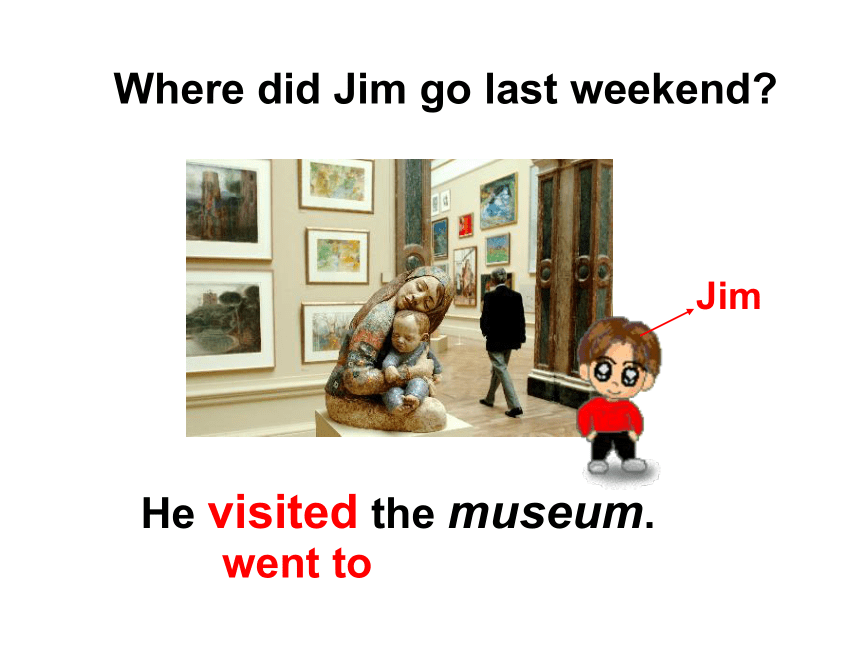
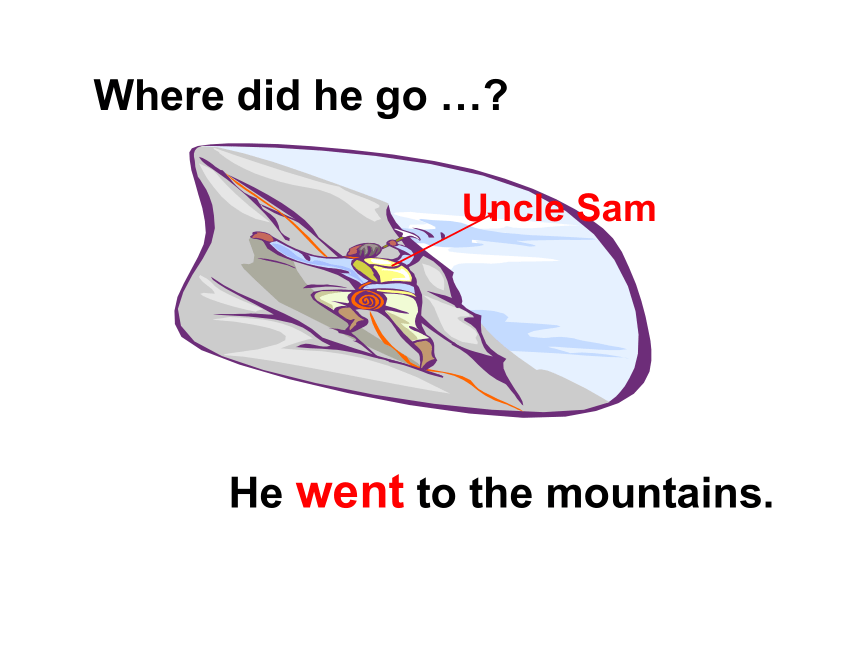
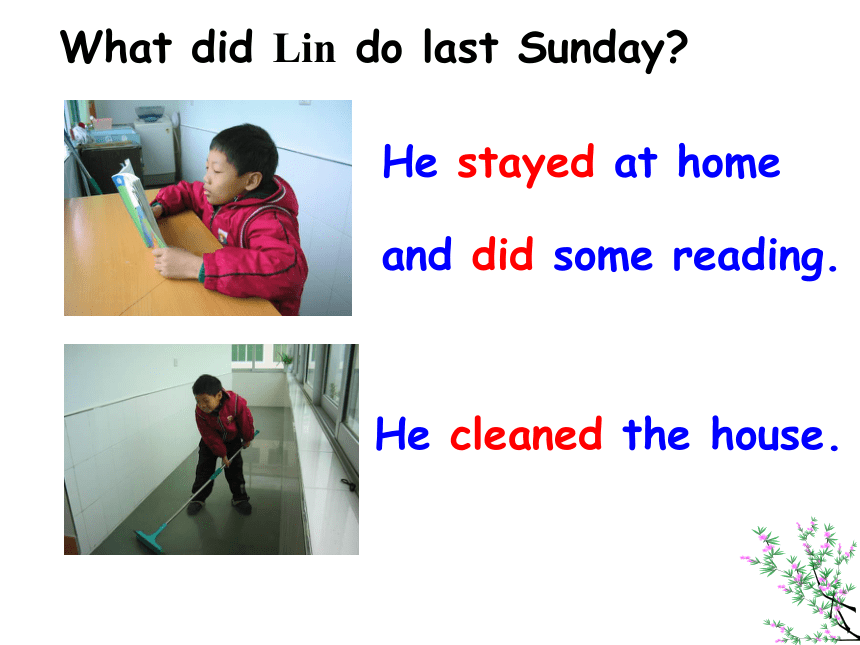
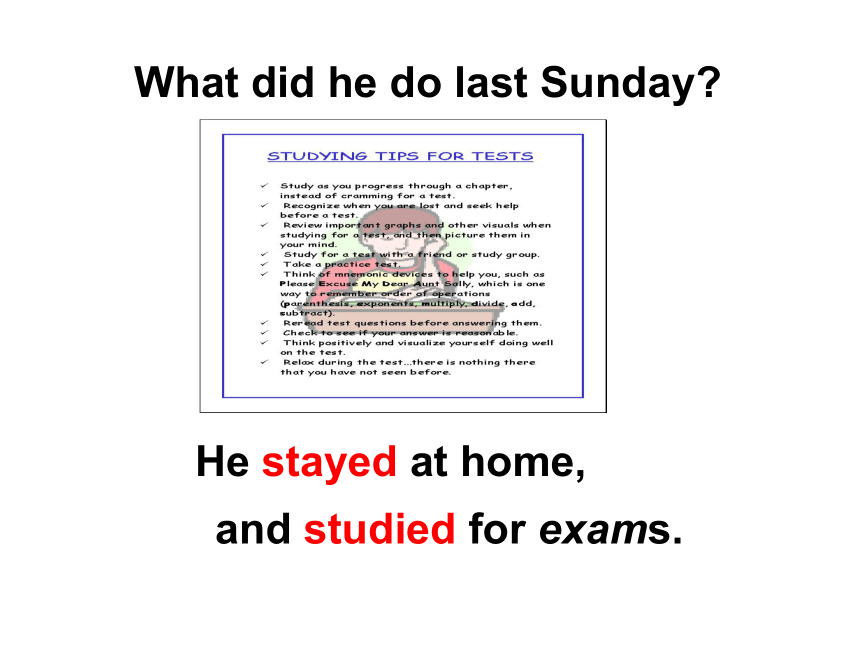
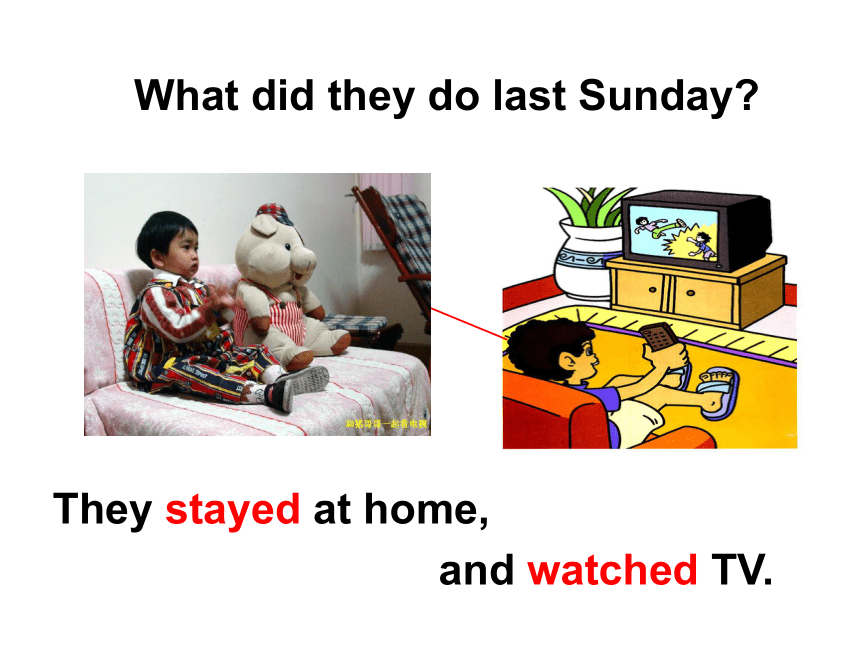
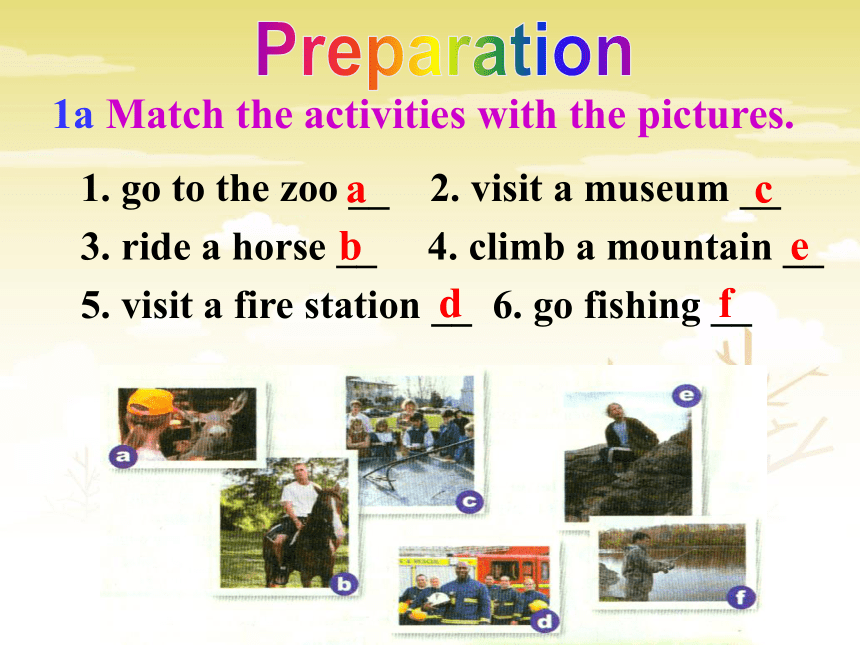
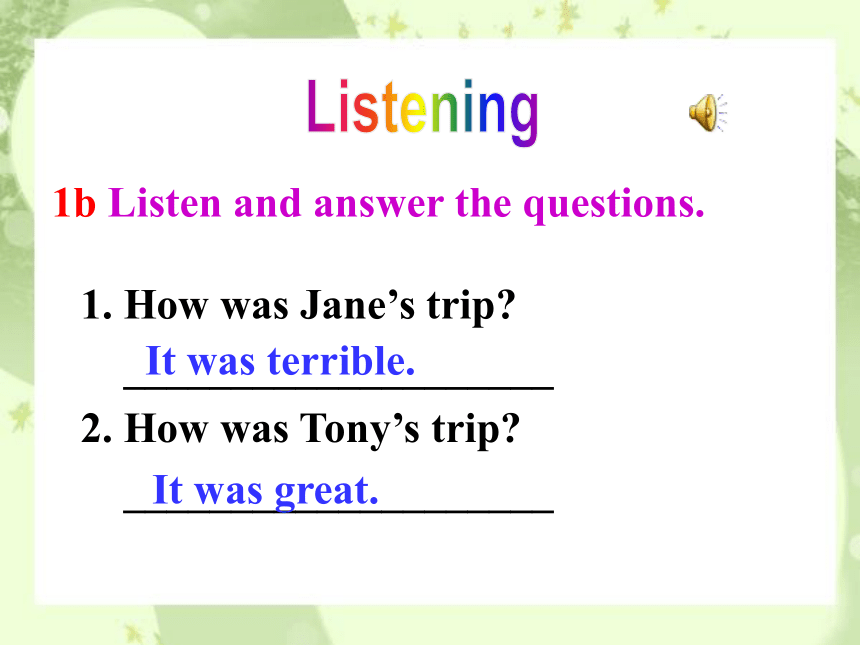
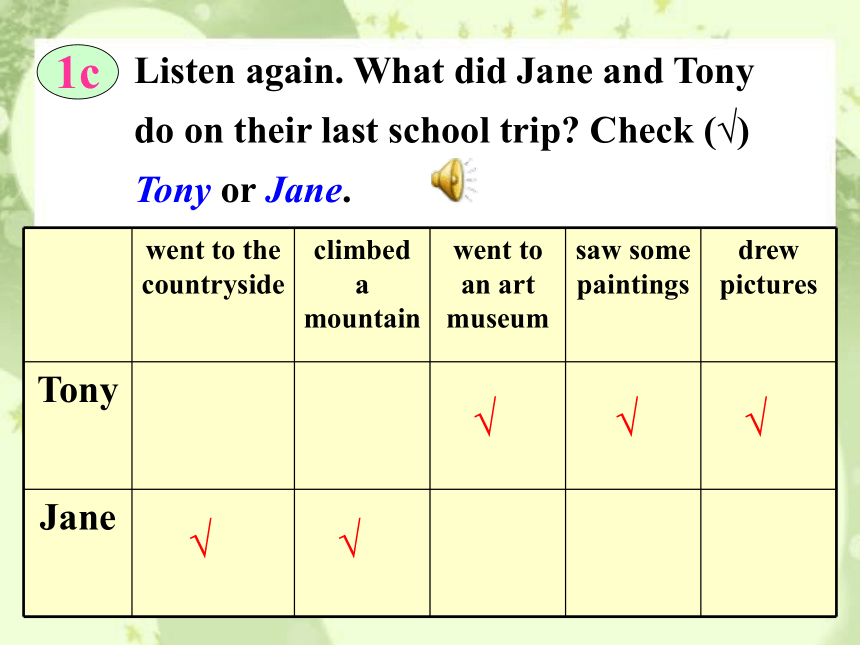
文档简介
课件33张PPT。Section B 1
1a-2cUnit 11 How was your school trip?时态大考验 ((写出下列动词的过去式))
1. visit________ 2.climb______
3. pick_______ 4. grow ______
5.draw _______ 6. ask _______
7. study ______ 8.learn ____________
9. can______ 10. buy ________ 11.teach______ 12. eat_________visitedclimbedpickedgrewdrewaskedstudiedlearned/learntcouldboughttaughtate教师寄语:Travel is the road to knowledge.
旅行是知识之路。
Warming-upMake up a story. Each student adds a sentence. If he or she can’t add a sentence.1 go to the zoo 2 visit a museum
3 ride a horse 4 climb a mountain
5 visit a fire station 6 go fishingLast week, I went to the zoo.
I __________ in the zoo. After that I ___________. I ___________________. __________________.Where did Jim go last weekend?He visited the museum.went toWhere did he go …?He went to the mountains.What did Lin do last Sunday?He stayed at homeand did some reading.He cleaned the house.What did he do last Sunday?and studied for exams.He stayed at home,They stayed at home,and watched TV.What did they do last Sunday?1a Match the activities with the pictures.1. go to the zoo __ 2. visit a museum __
3. ride a horse __ 4. climb a mountain __
5. visit a fire station __ 6. go fishing __Preparationacbedf1b Listen and answer the questions.1. How was Jane’s trip?
____________________
2. How was Tony’s trip?
____________________ListeningIt was terrible.It was great.1cListen again. What did Jane and Tony do on their last school trip? Check (√) Tony or Jane.√√√√√1d What was your last school trip like?
Discuss it with your partner with
the following words. interesting difficult lovely slow
exciting boring cool hot
lucky large expensive terrible
delicious great cheap fastPairworkA: I went to a farm on my last school trip.
There were many animals on the farm.
They were very lovely.
B: That sounds great.
A: How was your school trip?
B: It was __________
A: How was the food there?
B: It was _____________
A: How was the weather?
B: It was ___________ Do the following words describe good things or bad things? Put a√ for good and an ×for bad. Leave a blank if they can mean both.2a____ interesting ____ difficult ____ lovely ____ slow
____ exciting ____ boring ____ cool ____ hot
____ lucky ____ large ____ expensive ____ terrible
____ delicious ____ great ____ cheap ____ fast√√√√√√√√×××××Lead inscience museum2b Read Helen’s and Jim’s diary entries
and answer the questions.1. Did Helen and Jim go on the same trip?
2. How do they feel about the trip?Yes, they did. They went on the same trip.Helen thought the trip was really interesting. But Jim thought the trip was terrible.ReadingRead Helen’s and Jim’s diary entries again and find out the verbs in the past tense.went, visited, was, got, saw, learned, could, taught, took, bought, wereCan you write out the verbs in the base form? 2c Read the diaries again and complete
the chart. How do Helen and Jim
describe these things?interestingterrible
so hot
big and boring
The things in the gift shop were so expensive.The gifts
weren’t
expensive. so fast
useful Language points 1. All in all, it was an exciting day.
总之,这是令人兴奋的一天。
all in all 相当于汉语中的“总的说来;总之;
整体上说”用来对所阐述的内容进行概括性总
结及归纳。例如:
All in all, I think you did a good job.
总的说来,我认为你干得很好。an exciting day 让人兴奋的一天
exciting是形容词, 后接名词,意思是“让人兴奋的,使人兴奋的”,多形容物。
excited也是形容词, 多用来形容人感到,同类的有interesting, interested; boring, bored。 2. Everything was about robots and I’m not
interested in that.
每个东西都是关于机器人的,我对此不感
兴趣。
be interested in …对……感兴趣
例如:
We are interested in English.
我们对英语感兴趣。 interested / interesting 二者均为形容词,
interested 用于“be (become) interested in的结构中,表达的是某人对某事或某物是感兴趣的;
而 interesting 则指某事或某物本身具有使人感兴趣的特性,即某事(物)本身是“有趣的;有意思的”,在句中既可作定语,也可作表语。
I am interested in collecting stamps.
我对收集邮票很感兴趣。
That is an interesting book,you must read it.
那是一本很有意思的书,你一定要读读。辨析:interested / interesting 用interesting / interested 填空。
? ?
1. The book is very _________. Most of the teachers are _________in it. ???
2. The boy has much _________ in drawing.
3. 3岁的时候,他开始对音乐产生了兴趣。
He ______ _________ _______music when he was 3 years old.interestinginterestedinterested was interested in
not at all / not… at all 意思是“根本不;完全不”。
例如: I don’t like mutton at all.
我一点都不喜欢羊肉。
She’s not at all good at badminton.
她完全不擅长打羽毛球。3. I didn’t like the trip at all.
我一点也不喜欢这次旅游。 4. Then the guide taught us how to make a model robot.teach sb. to do sth. 教某人做某事 teach sb. sth. 教某人某事 teach oneself 自学 5. There were also too many people.too many加可数名词 too many students
too much加不可数名词 too much water6. Everything was about robots.everything 作主语,谓语动词用单数。7. it was difficult to take photos.It is + adj. (for sb.) to do sth. (对某人来说)做 … 怎么样
e.g. 对我来说骑车上学是很容易的。
It is easy for me to go to school by bike.8. today’s school trip
表示有生命的东西的名词及某些表示时间、距离、星球、世界、国家等无生命的东西的名词后加 ’s来表示所有关系,叫做名词所有格。
例如: men’s room 男厕所 a mile’s distance 一英里的距离
但如果该名词是以-s或-es接尾,则只在该名词后加“’”来构成所有格。
例如: 3 hours’ walk 三小时的路程 five minutes’ walk 五分钟路程 two miles’ distance 两英里的距离 翻译下列短语和句子。
1. 到达那儿
2. 下棋
弹钢琴
打篮球
3. 对感兴趣
4. 总之get there
play chess
play the piano
play basketball
be interested in
all in all Exercises5. 根本不
6. 今天的报纸
7. 太多学生
太多水
8. 学英语对我来说很容易。
9. 上周李老师教我如何下棋。 not …at all
today’s newspaper
too many students
too much water
It is easy for me to learn English.
Last week Mr. Li taught me how to play chess. June 15th
Today I_____. We ___ the science museum and it ___.
We ___ ____ so fast by train. We ___ some farms and
villages ___ the way. ___ the museum, I _____ a lot ___
robots. I ____ know they ___ play chess with us. It ___
so cool! Then the guide ___ us how to ___ a model
robot. I ____ a lot of great photos,too. After that, I ___ to
the gift shop and ___ some lovely gifts ___ my parents.
They ___ expensive. _______, it ___ an ____ day.Retelling June 15th
I think ___ school trip ___ terrible. We ___
the train ___ the museum. It ___ so hot on the
___ train. The museum ___ big and boring.
Everything ___ about robots and I ___ not
___ ___ that. The rooms ___ really dark and it
____ difficult ___ take photos, so I ___ take
___. There ___ also ____ ____ people and I
____ really see __ hear the guide. The things in
the gift shop ___ so expensive. I ____ like the
trip ____. Goodbye!
1a-2cUnit 11 How was your school trip?时态大考验 ((写出下列动词的过去式))
1. visit________ 2.climb______
3. pick_______ 4. grow ______
5.draw _______ 6. ask _______
7. study ______ 8.learn ____________
9. can______ 10. buy ________ 11.teach______ 12. eat_________visitedclimbedpickedgrewdrewaskedstudiedlearned/learntcouldboughttaughtate教师寄语:Travel is the road to knowledge.
旅行是知识之路。
Warming-upMake up a story. Each student adds a sentence. If he or she can’t add a sentence.1 go to the zoo 2 visit a museum
3 ride a horse 4 climb a mountain
5 visit a fire station 6 go fishingLast week, I went to the zoo.
I __________ in the zoo. After that I ___________. I ___________________. __________________.Where did Jim go last weekend?He visited the museum.went toWhere did he go …?He went to the mountains.What did Lin do last Sunday?He stayed at homeand did some reading.He cleaned the house.What did he do last Sunday?and studied for exams.He stayed at home,They stayed at home,and watched TV.What did they do last Sunday?1a Match the activities with the pictures.1. go to the zoo __ 2. visit a museum __
3. ride a horse __ 4. climb a mountain __
5. visit a fire station __ 6. go fishing __Preparationacbedf1b Listen and answer the questions.1. How was Jane’s trip?
____________________
2. How was Tony’s trip?
____________________ListeningIt was terrible.It was great.1cListen again. What did Jane and Tony do on their last school trip? Check (√) Tony or Jane.√√√√√1d What was your last school trip like?
Discuss it with your partner with
the following words. interesting difficult lovely slow
exciting boring cool hot
lucky large expensive terrible
delicious great cheap fastPairworkA: I went to a farm on my last school trip.
There were many animals on the farm.
They were very lovely.
B: That sounds great.
A: How was your school trip?
B: It was __________
A: How was the food there?
B: It was _____________
A: How was the weather?
B: It was ___________ Do the following words describe good things or bad things? Put a√ for good and an ×for bad. Leave a blank if they can mean both.2a____ interesting ____ difficult ____ lovely ____ slow
____ exciting ____ boring ____ cool ____ hot
____ lucky ____ large ____ expensive ____ terrible
____ delicious ____ great ____ cheap ____ fast√√√√√√√√×××××Lead inscience museum2b Read Helen’s and Jim’s diary entries
and answer the questions.1. Did Helen and Jim go on the same trip?
2. How do they feel about the trip?Yes, they did. They went on the same trip.Helen thought the trip was really interesting. But Jim thought the trip was terrible.ReadingRead Helen’s and Jim’s diary entries again and find out the verbs in the past tense.went, visited, was, got, saw, learned, could, taught, took, bought, wereCan you write out the verbs in the base form? 2c Read the diaries again and complete
the chart. How do Helen and Jim
describe these things?interestingterrible
so hot
big and boring
The things in the gift shop were so expensive.The gifts
weren’t
expensive. so fast
useful Language points 1. All in all, it was an exciting day.
总之,这是令人兴奋的一天。
all in all 相当于汉语中的“总的说来;总之;
整体上说”用来对所阐述的内容进行概括性总
结及归纳。例如:
All in all, I think you did a good job.
总的说来,我认为你干得很好。an exciting day 让人兴奋的一天
exciting是形容词, 后接名词,意思是“让人兴奋的,使人兴奋的”,多形容物。
excited也是形容词, 多用来形容人感到,同类的有interesting, interested; boring, bored。 2. Everything was about robots and I’m not
interested in that.
每个东西都是关于机器人的,我对此不感
兴趣。
be interested in …对……感兴趣
例如:
We are interested in English.
我们对英语感兴趣。 interested / interesting 二者均为形容词,
interested 用于“be (become) interested in的结构中,表达的是某人对某事或某物是感兴趣的;
而 interesting 则指某事或某物本身具有使人感兴趣的特性,即某事(物)本身是“有趣的;有意思的”,在句中既可作定语,也可作表语。
I am interested in collecting stamps.
我对收集邮票很感兴趣。
That is an interesting book,you must read it.
那是一本很有意思的书,你一定要读读。辨析:interested / interesting 用interesting / interested 填空。
? ?
1. The book is very _________. Most of the teachers are _________in it. ???
2. The boy has much _________ in drawing.
3. 3岁的时候,他开始对音乐产生了兴趣。
He ______ _________ _______music when he was 3 years old.interestinginterestedinterested was interested in
not at all / not… at all 意思是“根本不;完全不”。
例如: I don’t like mutton at all.
我一点都不喜欢羊肉。
She’s not at all good at badminton.
她完全不擅长打羽毛球。3. I didn’t like the trip at all.
我一点也不喜欢这次旅游。 4. Then the guide taught us how to make a model robot.teach sb. to do sth. 教某人做某事 teach sb. sth. 教某人某事 teach oneself 自学 5. There were also too many people.too many加可数名词 too many students
too much加不可数名词 too much water6. Everything was about robots.everything 作主语,谓语动词用单数。7. it was difficult to take photos.It is + adj. (for sb.) to do sth. (对某人来说)做 … 怎么样
e.g. 对我来说骑车上学是很容易的。
It is easy for me to go to school by bike.8. today’s school trip
表示有生命的东西的名词及某些表示时间、距离、星球、世界、国家等无生命的东西的名词后加 ’s来表示所有关系,叫做名词所有格。
例如: men’s room 男厕所 a mile’s distance 一英里的距离
但如果该名词是以-s或-es接尾,则只在该名词后加“’”来构成所有格。
例如: 3 hours’ walk 三小时的路程 five minutes’ walk 五分钟路程 two miles’ distance 两英里的距离 翻译下列短语和句子。
1. 到达那儿
2. 下棋
弹钢琴
打篮球
3. 对感兴趣
4. 总之get there
play chess
play the piano
play basketball
be interested in
all in all Exercises5. 根本不
6. 今天的报纸
7. 太多学生
太多水
8. 学英语对我来说很容易。
9. 上周李老师教我如何下棋。 not …at all
today’s newspaper
too many students
too much water
It is easy for me to learn English.
Last week Mr. Li taught me how to play chess. June 15th
Today I_____. We ___ the science museum and it ___.
We ___ ____ so fast by train. We ___ some farms and
villages ___ the way. ___ the museum, I _____ a lot ___
robots. I ____ know they ___ play chess with us. It ___
so cool! Then the guide ___ us how to ___ a model
robot. I ____ a lot of great photos,too. After that, I ___ to
the gift shop and ___ some lovely gifts ___ my parents.
They ___ expensive. _______, it ___ an ____ day.Retelling June 15th
I think ___ school trip ___ terrible. We ___
the train ___ the museum. It ___ so hot on the
___ train. The museum ___ big and boring.
Everything ___ about robots and I ___ not
___ ___ that. The rooms ___ really dark and it
____ difficult ___ take photos, so I ___ take
___. There ___ also ____ ____ people and I
____ really see __ hear the guide. The things in
the gift shop ___ so expensive. I ____ like the
trip ____. Goodbye!
同课章节目录
- Unit 1 Can you play the guitar?
- Section A
- Section B
- Unit 2 What time do you go to school?
- Section A
- Section B
- Unit 3 How do you get to school?
- Section A
- Section B
- Unit 4 Don't eat in class.
- Section A
- Section B
- Unit 5 Why do you like pandas?
- Section A
- Section B
- Unit 6 I'm watching TV.
- Section A
- Section B
- Review of Units 1-6
- Unit 7 It's raining!
- Section A
- Section B
- Unit 8 Is there a post office near here?
- Section A
- Section B
- Unit 9 What does he look like?
- Section A
- Section B
- Unit 10 I'd like some noodles.
- Section A
- Section B
- Unit 11 How was your school trip?
- Section A
- Section B
- Unit 12 What did you do last weekend?
- Section A
- Section B
